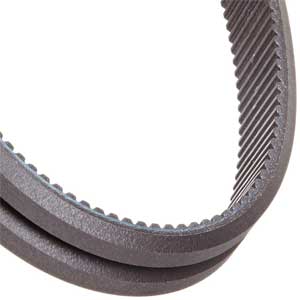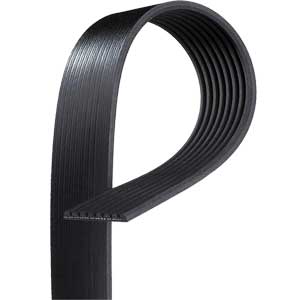

Specifications
| ZZR Part No | 3-5M415 | Length [mm] | 415 |
| Interchange Polyflex, Banflex, Polymax, Neothane | 3-5M415JB | 3R-5M415 | 3-5MS415 | No. of Ribs | 3 |
| Top Width [mm] | 5 | Nominal Height [mm] | 3 |
| Top Width [inch] | 0.19 | Nominal Height [inch] | 0.13 |
| Materials | Neoprene | Tensile Cord | Polyester |
| Angle [degrees] | 60 | Operating Temp C | -30 Degrees ~ +90 Degrees C |
| Profile | Wide Angle | Operating Temp F | -22 Degrees ~ +194 Degrees F |
| Special Requirements | On Request | Industries and Applications | Machine Tools, Computer Peripherals, Medical Equipment, Library Equipment, Small Appliances, Blower Drives and Woodworking Machines. Agriculture & Fishery, Automotive, Chemical, Energy, Infrastructure, Machine Construction, Maritime, Oil and Gas, Petrochemical and Refining, Pharma, Primary Industries, Pulp and Paper, Waste Industry, Water and Wastewater Industry |
(Note: Custom sizes and colors available upon request)
Description
3-5M415JB, 3R-5M415, 3-5MS415 Wide Angle Belts are potential replacement belts. Wide Angle Belts are offered with ribs. 3-5M415 have some advantages. More specifically, neoprene compound resists fatigue, wear, ozone, and most environmental conditions. Polyester tensile cords provide length stability and superior resistance to fatigue. Ribbed backing assures lateral rigidity and relieves bending stress on small diameter pulleys. 60 degree angle gives greater support to tensile section for even load distribution.
Applications
– Machine tools
– Computer peripherals
– Medical equipment
– Library equipment
– Small appliances
– Blower drives
– Woodworking machines
Key Features & Benefits
– High-speed power transmission with low vibration.
– Compact design and cost efficient.
– Maintenance-free and stretch resistance.
– Excellent weather resistance.
Unique Characteristics
– Long belt life on small pulleys and compact drives.
– Greater shaft speeds, up to 30,000 rpm.
– High performance and smooth running for precision applications.
– Cost savings and design freedom.
– Avoids vibrations when subjected to shock loads.
– Temperature ranges from -30 Degrees up to +90 Degrees C.
